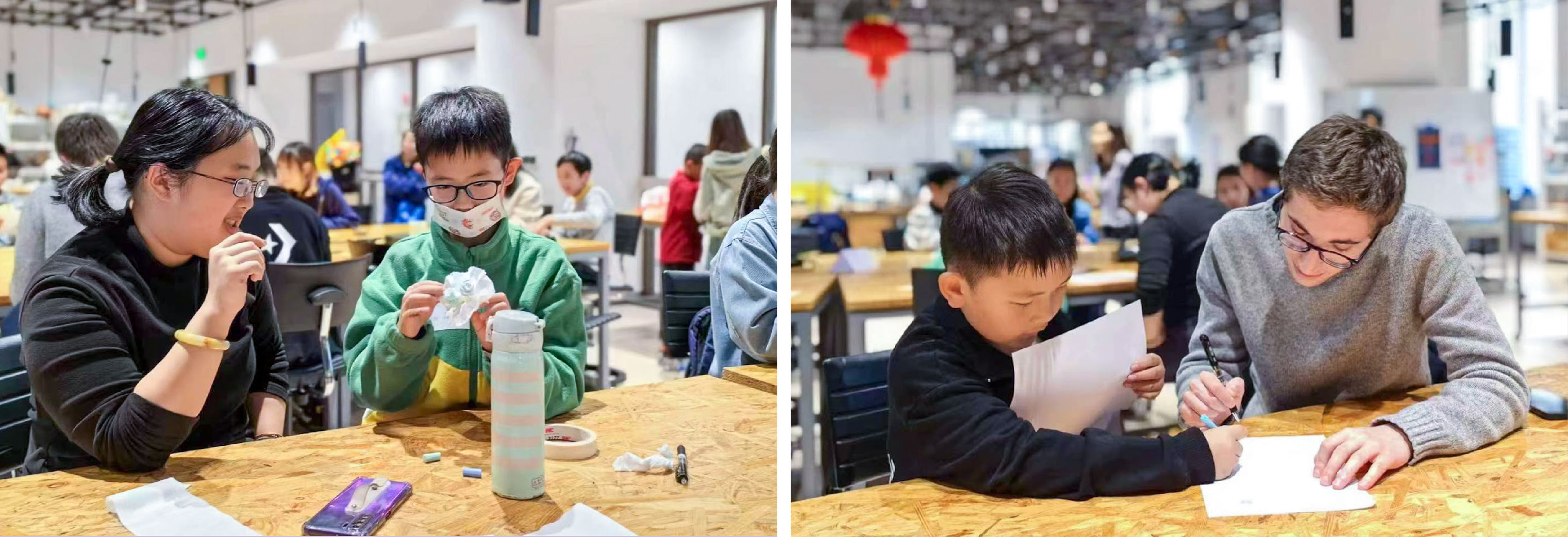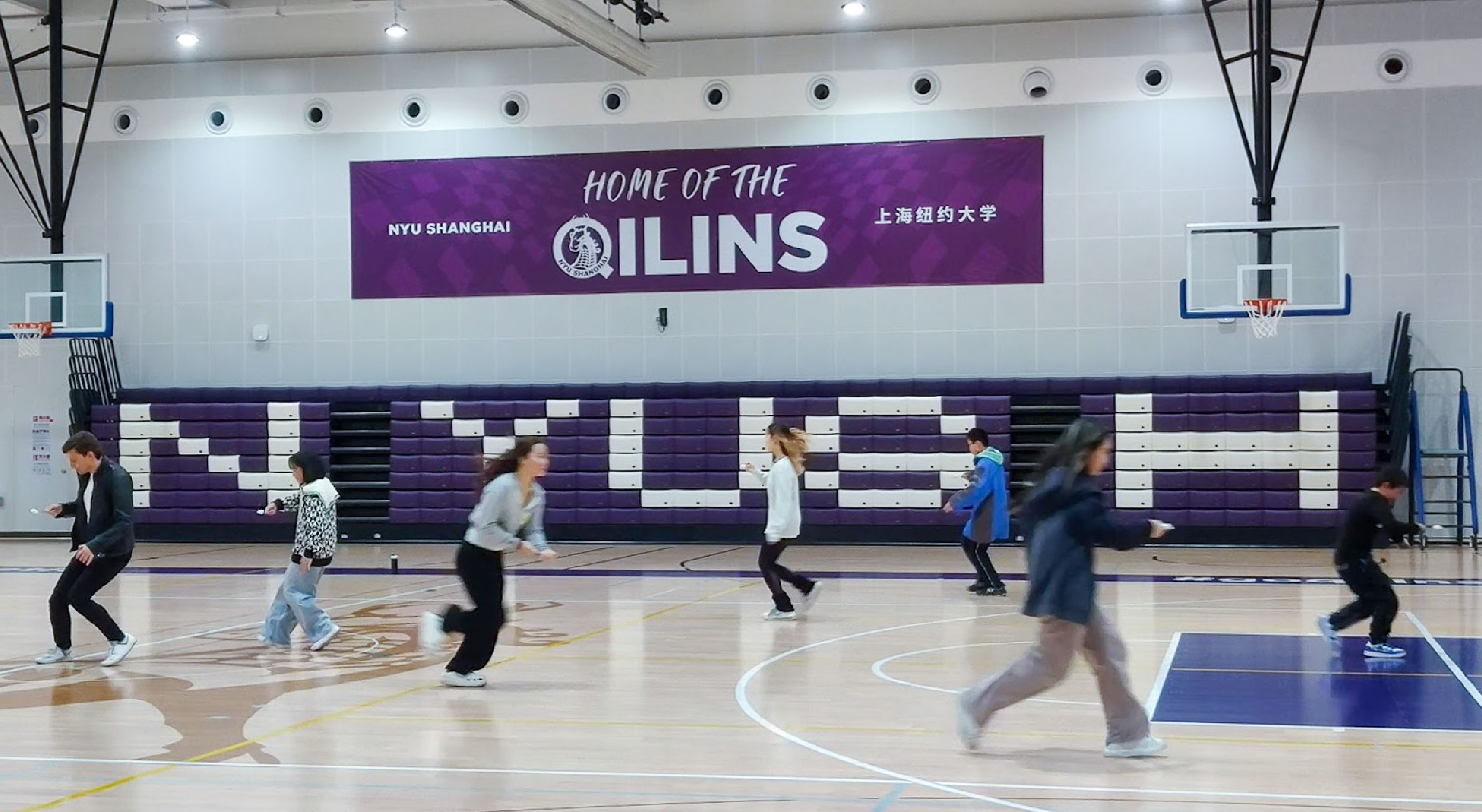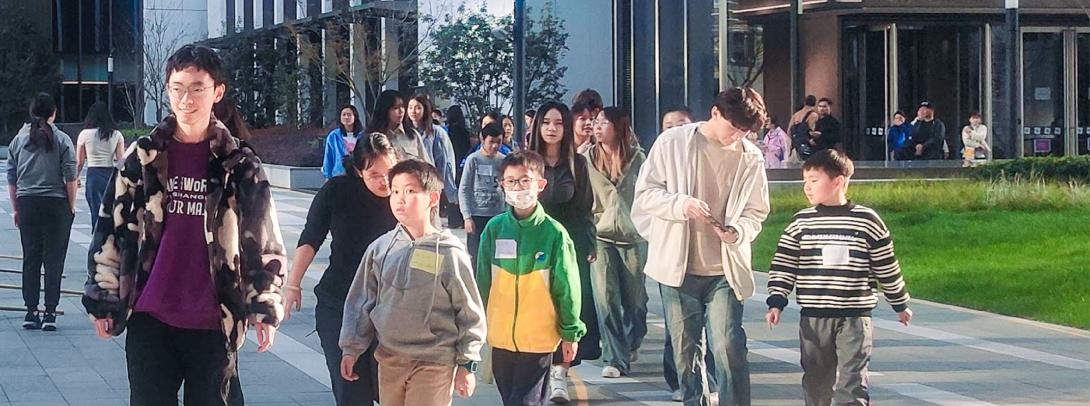The move to the New Bund campus in 2023 has meant more than just beautiful facilities–it also means building new relationships with our neighboring community. In order to connect with and support migrant and low-income families in the area, the Office for Community Engaged Learning (CEL) has launched the second semester of its Big Brothers Big Sisters (BBBS) program. The program pairs NYU Shanghai students with children, aged 8 to 11 years old, from the surrounding community to form one-on-one relationships.
The "sibling" pairs meet several times over the semester on Friday evenings at the New Bund campus. Each gathering starts with a group activity designed by the “big siblings,” which take place in different areas around the campus to expose the children to various aspects of university life. Afterwards, the students get to know their “little siblings” over dinner in the campus cafeteria.
“We want to feel connected to those who live near us, which I think is important given that we've only been in this building for a year and a half," explains Associate Dean for Academic Affairs and Clinical Associate Professor in English for Academic Purposes Steve Iams. He is partnering with CEL to provide guidance to the students on activity design, mentorship, and youth development. Iams is also considering the development of a course in which students would study academic theories of mentorship, among other topics, while participating in the BBBS program to gain hands-on experience.
Building community with neighboring communities is important, particularly because the New Bund campus is part of the Qiantan real estate development, which has changed the area’s makeup significantly in recent years. What used to be an urban village that was home to many low-income and migrant communities has become a burgeoning financial center that developers hope will be known as a “second Lujiazui,” referring to Shanghai’s glitzy business district across the Huangpu river.

Left: Cheng Xinyi '24 and Zhang Zhuoran make paper roses together at the IMA lab Right: Edoardo Gargiulo '26 and Wang Junxi take part in an activity entitled “You Describe I Draw”
The BBBS program extends resources to underprivileged families with the aim of creating connections with them. “[We hope] to dispel some impressions of higher education, or buildings that look like this, as being intimidating or not places that welcome them,” says Assistant Provost for Academic Affairs and Director of CEL Diane Geng. Access and exposure to a university atmosphere and one-on-one mentorship relationships with older students are especially valuable, she says, as these children may have less access to such experiences and resources.
The Big Brothers Big Sisters program has benefited from partnering with the New City Residents’ Center, a local community organization founded in 2009 by Yi Liying to serve the needs of local migrant communities in the Sanlin area near campus. Given the organization’s close relationship with families in the area, the center has acted as a liaison between NYU Shanghai and the broader community. Parents of the children in the program say their kids are gaining a lot. “This is a really meaningful experience in my child’s life,” says Wen Honghua, whose 5th grader is participating in this semester’s activities.

Playing games in the gym together
It’s not just the local families who gain from the program–NYU Shanghai students benefit, too. They serve as mentors and plan activities for the children, which have been important educational experiences. The students learn to design and facilitate activities that are age-appropriate, engaging, fun, and accessible for their “little siblings,” who are in grades 3 through 5. “I feel maybe there is a chance I can [act as a mentor to] them or give them a happy memory in their childhood,” says “big sister" Maelyn Lu ‘26. “That is a super meaningful thing to me.”
At one recent BBBS gathering, Lu worked with other students to lead a crafting activity, teaching the children to make paper roses. “All crafts utilize daily-use materials, like toilet paper, plastic bags, and paper cups–this way, they can make these crafts again at home,” says CEL Coordinator Susan Dai. The students planned other activities too, including team games in the gym, drawing and telling stories together, and leading a scavenger hunt in the library.
Lu says spending time with her "little sibling" has changed her perspective on mentorship. “[Before the program started], I used to think I would be providing support and helping the children face the challenges of being in the migrant community," Lu says. Now she says, she’s realized the greater value of the program in building personal relationships and connections. “That is an important mindset change.”
Support from program staff like Geng, Iams, and Dai has helped her and other students create positive experiences for the children, Lu says. “There's a lot of creativity and real joy that goes into planning an activity for kids,” adds Iams. “It doesn't involve standing up there and lecturing, or a one-way transmission of information. It involves doing things together.”
The “little siblings” have been enjoying the program, too. “I’m having a great time,” says Tang Xiaoyu, 9, who is participating in BBBS activities this semester. “[The program] allows me to experience college life, and makes me look forward to attending college.”


